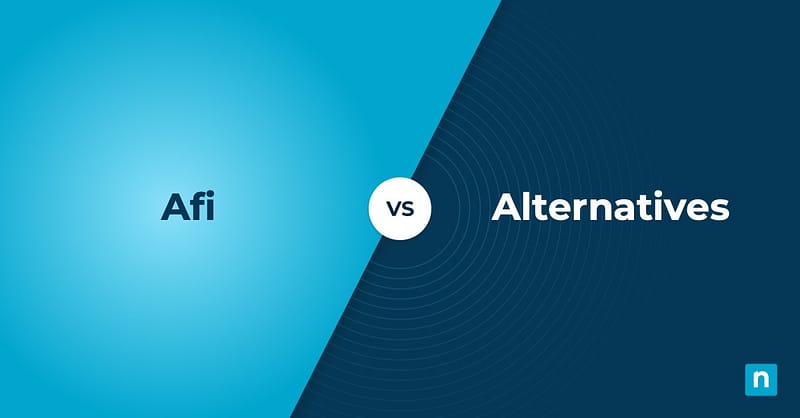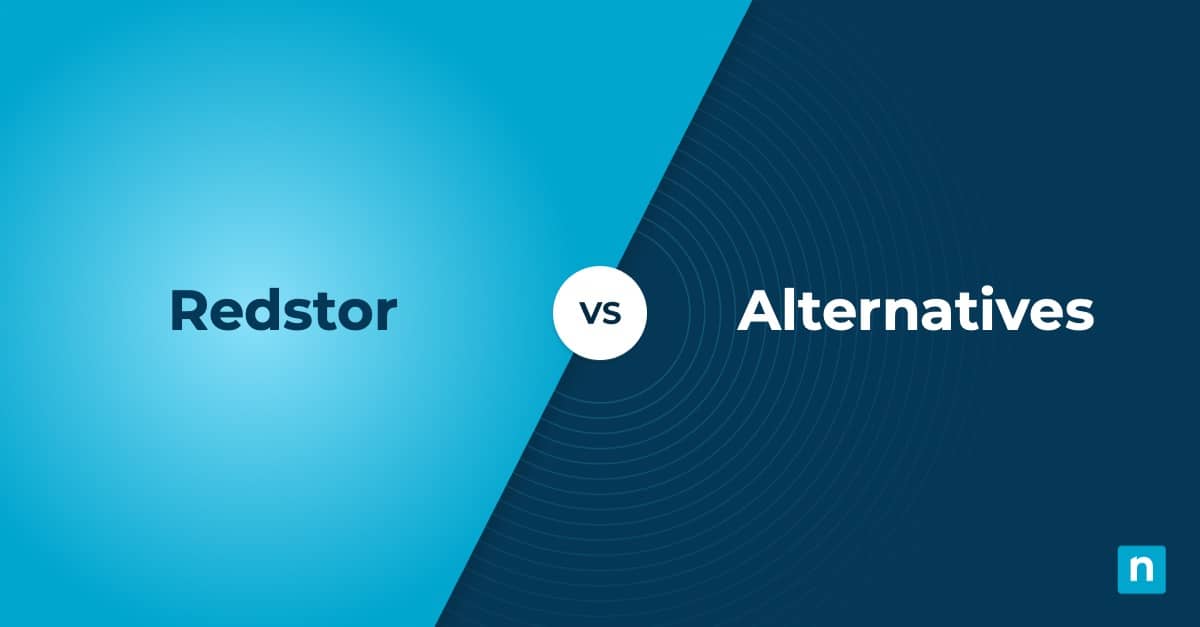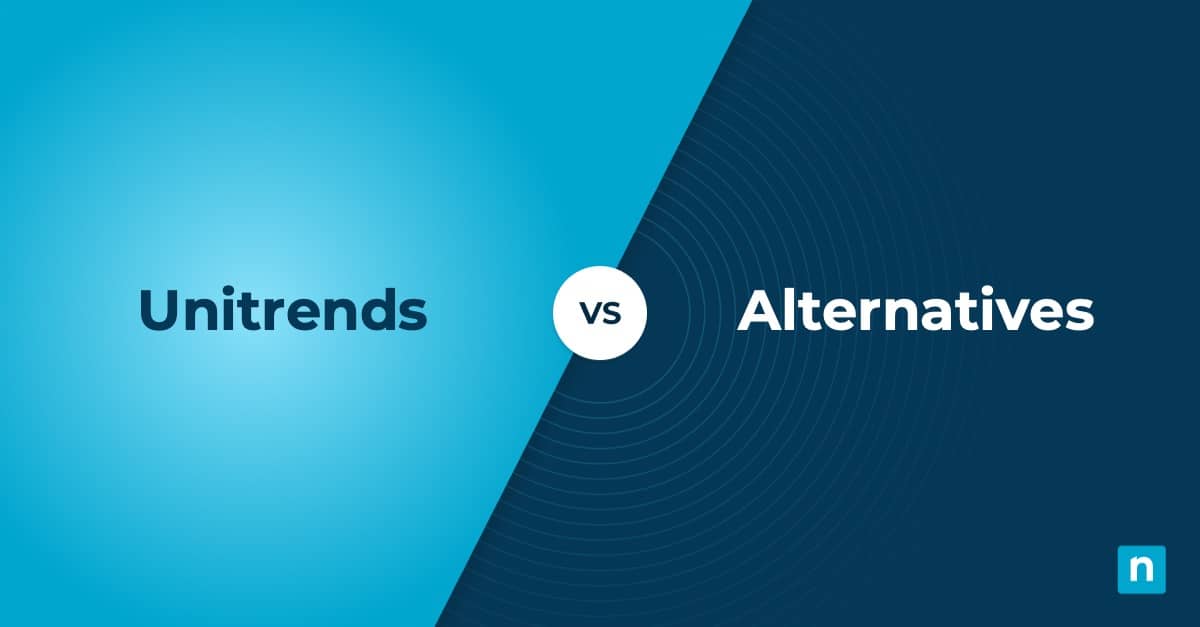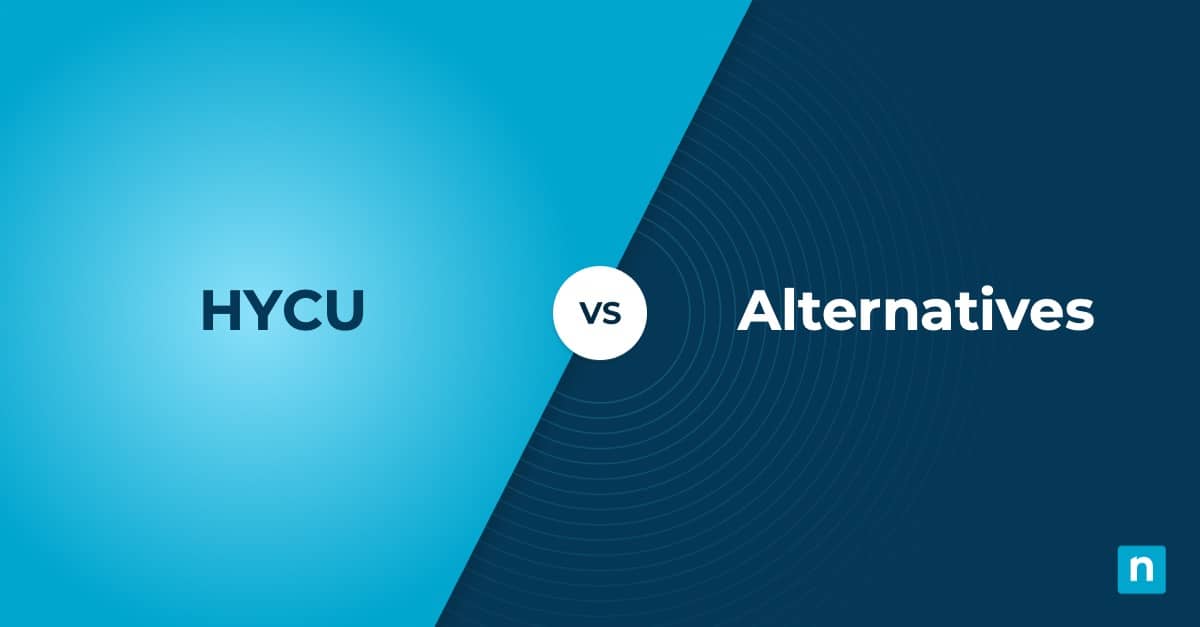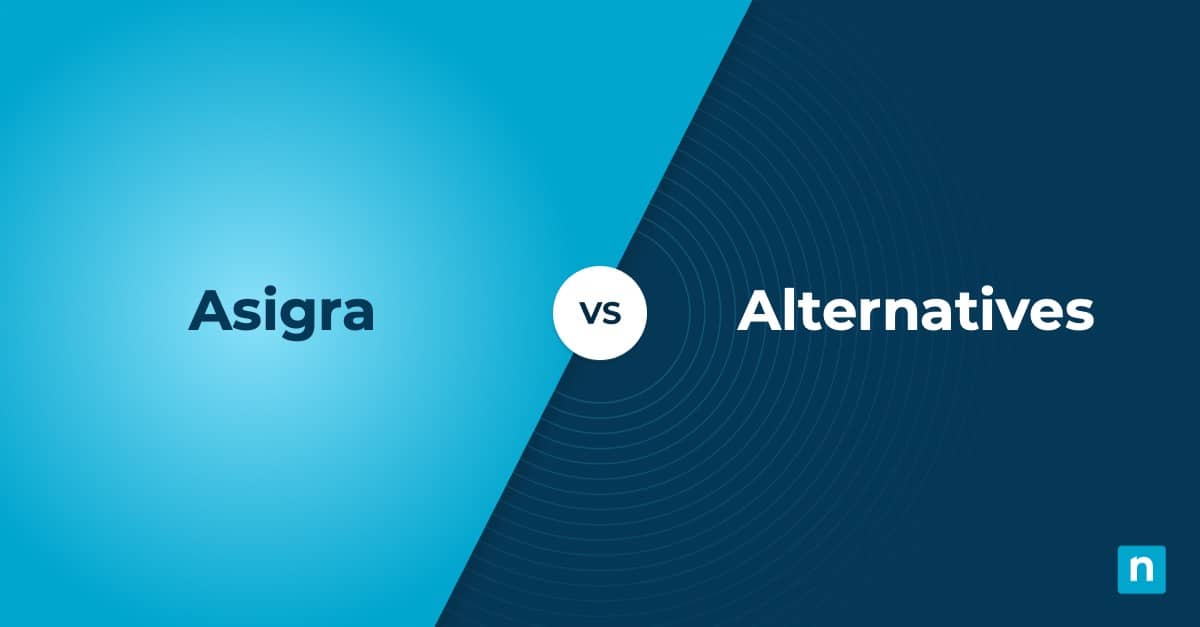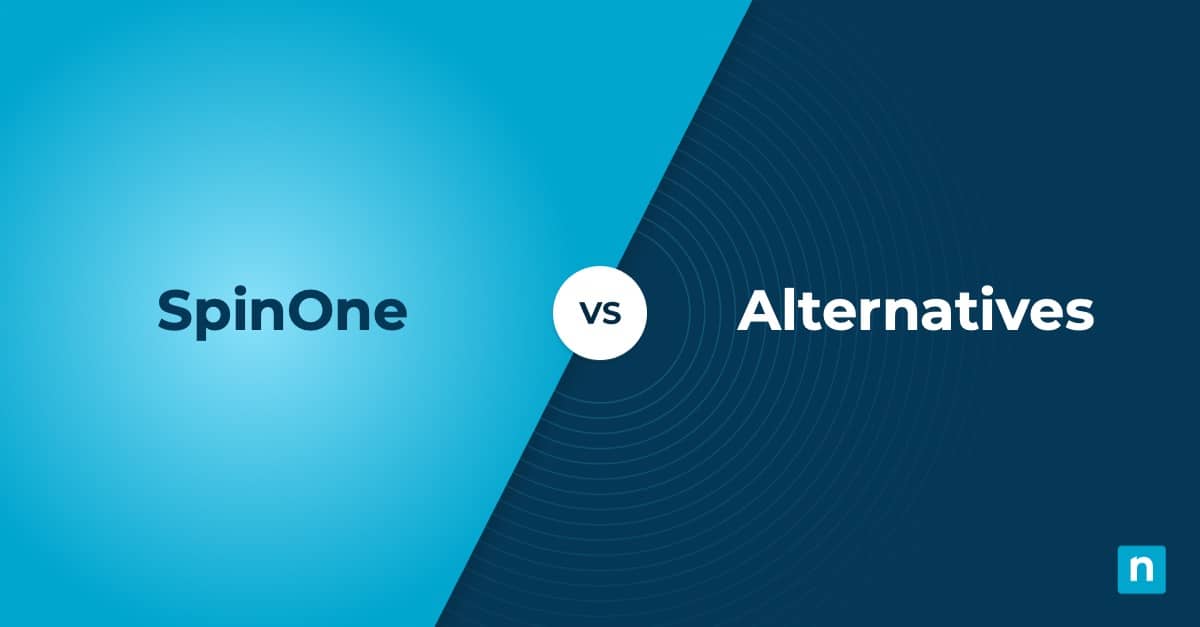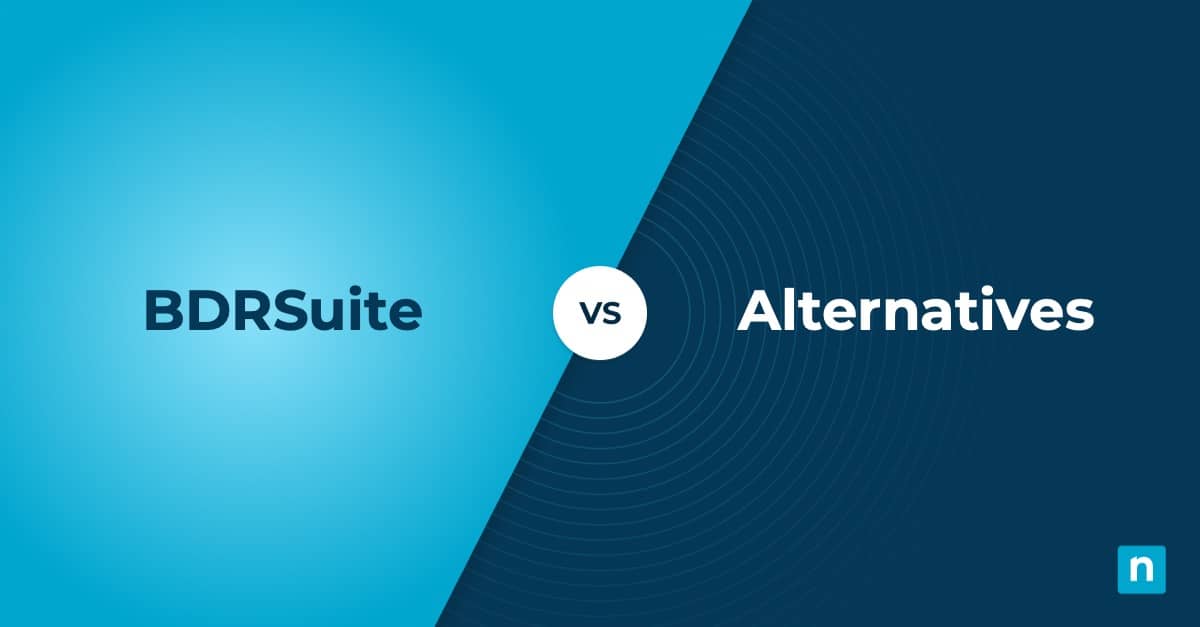Security is one of the top priorities for many organizations, given that the digital world runs on data. That’s why SaaS platforms like Google Workspace and Microsoft 365 are thriving since many organizations utilize these services. They are perceived to be effective in protecting sensitive information and ensuring business continuity. However, these SaaS platforms may have limited coverage when it comes to specialized security threats, data residency and retention requirements, and granular data recovery needs. This is where SaaS backup platforms like Afi come in.
Afi is a data resiliency and protection solution that offers tools primarily focused on backing up SaaS platforms. Afi may be ideal for those that heavily rely on workloads saved on the cloud, but other organizations may want to consider other solutions that meet their requirements. That’s why we gathered the top Afi alternatives and competitors that may be able to cater to other essential needs that Afi may not address.
1. NinjaOne
For organizations seeking a more unified and streamlined approach to IT operations, NinjaOne delivers a complete endpoint management platform that combines essential tools for monitoring, managing, and securing IT environments. Beyond its core capabilities, NinjaOne also includes a reliable backup and recovery solution designed to protect both endpoints and select SaaS data. Below are some of the key features that set NinjaOne apart:
Key features
- Cloud-native solution: At its core, NinjaOne is a cloud-native IT platform that prioritizes scalability, remote accessibility, and seamless updates to support modern, distributed IT environments. This is best suited for organizations seeking an IT management platform for their multi-state infrastructure, hybrid or remote workforce, and even MSP operations.
- Automation: NinjaOne ensures efficiency and promotes productivity with its automation tools for various IT tasks, including backups for endpoints and SaaS. This enables system administrators and technicians to simplify the processes for repetitive tasks by automating routine workflows such as patch management, script execution, and more.
- Support for major OS: For its essential capabilities, NinjaOne offers comprehensive support for major operating systems such as Windows, macOS, Linux, and mobile platforms running on Android and iOS. This allows IT teams to carry out IT operations in one centralized console despite having a diverse mix of operating systems and platforms within an environment.
- Remote monitoring and management: A vital functionality of NinjaOne is its top-rated RMM solution according to MSPs. NinjaOne’s RMM provides tools for many aspects of proactive IT management, including real-time monitoring, alerting, remote access, and system diagnostics.
5 reasons to choose NinjaOne over Afi
1. Centralized console for comprehensive IT operations
It’s easier when the tools you need are in one place, making operations more efficient and streamlined. While Afi provides a centralized console for managing backups, the key difference lies in the breadth of NinjaOne’s platform. For IT teams and MSPs, NinjaOne’s “single pane of glass” approach to IT management consolidates a much wider range of functions, from remote monitoring and patch management to endpoint security and, of course, SaaS backups. This reduces the reliance on other tools to perform different tasks, saving IT teams, technicians, and MSPs a significant amount of time.
2. Backup and recovery for endpoints and SaaS
Aside from its plethora of essential IT features, NinjaOne also offers robust backup and recovery capabilities. While Afi offers SaaS backup and recovery, NinjaOne’s platform offers the same solutions, not only SaaS, but also all of your endpoints. Its backup and recovery management supports laptops, desktops, virtual servers, and physical infrastructure.
Meanwhile, NinjaOne’s dedicated SaaS backup showcases virtually unlimited storage and supports Microsoft 365 and Google Workspace. Recovery has also never been easier with NinjaOne’s fast, flexible restore options. Whether you need to recover individual files, full systems, or cloud-based data, NinjaOne’s backup and recovery is built to minimize downtime and ensure business continuity.
3. Broader IT management capabilities
Afi’s features are primarily focused on SaaS backup and recovery, which is suited for organizations looking for a dedicated platform for SaaS data protection. However, it’s not uncommon for many industries to need more than SaaS backup, making it inconvenient to use disparate tools for other operations. This is why NinjaOne is preferred by many because it offers comprehensive IT management capabilities alongside its backup and restore features.
4. Autonomous IT management, including backup automation
NinjaOne’s powerful automation features allow IT teams and system administrators to run repeated tasks. This empowers users to proactively handle both endpoint management and data protection without human intervention. The automation engine support includes setting up regular backups, patch deployments, executing custom scripts, and remediating common issues automatically.
5. Outstanding customer support
Users may overlook features if an IT management platform can’t provide helpful customer support. That’s why NinjaOne stands out among other solutions for its dedication to customer satisfaction and success. In fact, the IT solution has a 98.4% annual average CSAT score and a 31-minute annual average response time, a great testimonial to how committed NinjaOne is to providing stellar support and service to its users.
Customer story
One of the noblest services you can offer is helping animals to achieve wellness. That’s why it’s important for Vetcor, a community-centric veterinary services company, to always stay operational and responsive. To support its growing network of practices across the US and Canada, Vetcor trusts NinjaOne to handle its IT management needs, from new clinic onboarding to backing up data. Here’s what Ernie Turner, Vetcor’s Director of IT, has to say:
“NinjaOne streamlined new-clinic onboarding. What previously took weeks, we completed in a day with NinjaOne. NinjaOne Backup runs weekly on our servers. We’ve had instances where servers fail, and thanks to NinjaOne Backup, we could recover and restore that data. NinjaOne Backup saved our bacon many times.”
Turner has nothing but praise for NinjaOne, saying that having their tools in a single pane saves the company’s technicians valuable time.
Read more customer stories or check out NinjaOne reviews.
Reviews
- 2,520 reviews (at the time of writing)
- 4.7 / 5 stars
- 252 reviews (at the time of writing)
- 4.7 / 5 stars
Customer Quotes
“With NinjaOne, we have a single pane of glass to manage backups, [ticketing, antivirus, asset management], software updates, software deployment, remote management, and device management and monitoring.In less time, we are able to do so much more.”
– Joann Dewwealth-O’Brien, Senior Technology Manager at Rare
“The entire process of NinjaOne Backup is seamless and painless. It makes my job easier. If you can control an app, you can run NinjaOne Backup.”
– Raffi Kajberouni, President and General Manager at H.E.R.O.S.
“ Having everything in NinjaOne’s single pane of glass, whether it’s our antivirus or Backup, helps us maintain global security. We have a tighter security posture, we can mitigate threats in real time, and we can go into ransomware recovery if needed because we have backups available.
– Ron Thomas, Vice President of Technology at Rare
Pricing
NinjaOne offers flexible pay-per-device pricing that scales to meet your needs.
Explore how NinjaOne delivers rapid, dependable backup and recovery for endpoints and SaaS platforms.
2. Druva
Druva is a cloud-native cyber resilience platform designed to help organizations strengthen their defenses against cyber threats while ensuring data availability and regulatory compliance. Much like Afi, Druva offers direct-to-cloud backup and recovery. The platform also has built-in ransomware protection and is marketed towards enterprises and businesses.
Pros
- Agentless endpoint integration: Druva implements an agentless approach to manage endpoints. This means organizations don’t need to install software agents on individual endpoints, simplifying deployment and management.
- Ransomware threat response: Druva offers proactive tools for protecting backed-up data from ransomware threats. It also has recovery features that expand data security and reduce instances of data loss in case of ransomware attacks.
- Compliance tracking: Druva utilizes automation to keep track of data compliance. The system can also notify organizations of anomalies with data access, storage, or retention anomalies.
Cons
- Minimum adoption requirements: Another downside of Druva is its minimum adoption requirements, which make it less suitable for small businesses or organizations looking to scale down.
- File type support: The range of file types Druva supports may not be comprehensive enough for organizations that work with highly specialized or niche file formats.
- Reporting: According to some users, Druva needs to improve its reporting features to facilitate customizations to meet informational needs and requirements.
3. SpinOne
SpinOne is a security platform designed to protect data for cloud business applications. Like the other Afi alternatives in this list, it also offers backup and recovery capabilities, but specifically caters to organizations seeking a backup solution for their data hosted in cloud environments. SpinOne promises full visibility over SaaS application risks while helping organizations securely manage their cloud data.
Pros
- Ransomware protection: In addition to its backup and recovery capabilities, SpinOne also offers tools to stop ransomware threats in their tracks, helping organizations reduce potential disruptive ransomware damages.
- Shadow IT prevention: SpinOne helps with shadow IT risk mitigation through tools and functionalities such as automated risk assessment, SaaS environment visibility, and security posture management.
- Third-party risk mitigation: SpinOne can also assess risks that might be brought to SaaS apps and browsers by installing third-party extensions.
Cons
- User guidance: Some reviews mentioned that several more advanced features of SpinOne could benefit from clearer in-app guidance or tooltips, especially for newer users.
- Support: Other users suggested that more hands-on support could be a good addition during onboarding to speed up implementation.
- Reporting: Some SpinOne users noted that the platform’s reporting features could be improved by making it more customizable.
What is Afi?
Afi is a cloud-to-cloud backup provider that backs up data from cloud services to its cloud storage via secure APIs. The platform promises secure data backup and business continuity for organizations in cases of accidental file deletion, ransomware attacks, misconfigurations, and more. Afi boasts broad coverage for SaaS workloads, which is best suited for organizations looking for a service that can cater to their backup needs, especially if they rely heavily on SaaS apps for their operations.
While Afi may offer essential functionalities for some, each organization may prefer other services that can serve its specific needs, perhaps services that better align with its broader IT strategy. If you’re looking for a platform to deliver your infrastructure requirements, refer to this guide and the recommendations we provided above.
On choosing the best Afi alternative
As cyber-attacks get sophisticated over time, organizations should always be on the lookout when protecting their critical data, even if it’s stored in the cloud via SaaS platforms. This threat, along with the limited data retention policies and shared responsibility models of most SaaS providers, means that relying solely on built-in protections isn’t enough.
That’s why deciding on an Afi alternative or any IT solution with SaaS backup support should be well thought out. Aside from the platforms we listed above, you can also take advantage of free trials and demos. This way, you can test out if the specific features your organization needs meet your operational requirements, compliance, and recovery expectations.

